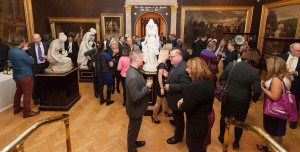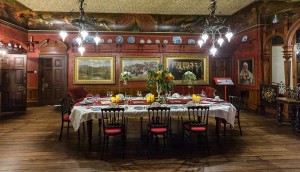News
CUSTOMER SERVICE WITH A SMILE – AND A NEW NAME
Customer service guru Simon Scarborough has changed the name of his consultancy – to reflect a wider range of recent business wins.
Mr Scarborough, former general manager of Bournemouth’s Norfolk Royale hotel, set up the Assured Hospitality consultancy in mid-2013 to offer best-practice advice to tourism businesses across Dorset.
Barely two-and-a-half years later, his client base has expanded beyond the tourism sector, prompting the decision to re-launch the company as Simon Scarborough Associates.
“Since setting up my own company, I have had the pleasure of working with a great many tourism-related organisations in and around Dorset,” says Mr Scarborough,” and I fully intend to continue that work.
“In recent months, however, I have been contracted by several companies – at a local, regional and national level – outside the tourism sector.”
In today’s commercial world, he says, forward-thinking entrepreneurs need to differentiate themselves from their competitors, and quality customer service is a sure-fire way of winning and retaining new business.
“I’m now working with a much broader client base, covering the legal, academic and retail professions, so we had rather outgrown the ‘hospitality’ tag.”
Mr Scarborough can be contacted on 07801 571357 or via the company’s new website, www.simonscarboroughassociates.co.uk.
RESEARCH REAPS REWARDS – DOING BUSINESS THE ‘WHY?’ WAY
Some weeks ago, slumped in front of the television after a particularly taxing day at the hospitality industry coalface, I chanced upon an early-evening repeat of Come Dine With Me – a lightweight programme in which a group of strangers score one another’s dinner-party hosting skills.
One woman was given an unusually poor rating because she had served an egg-based starter to someone who “just doesn’t like eggs”. The fact that the host knew nothing of her guest’s foodie foibles (and might have served something different if she had) seemed to play no part in the calculation.
Of course, life is full of little injustices, and if you’re daft enough to put yourself up for so-called reality TV shows, you’ll find there are quite a lot of big injustices too.
More to the point, this particular episode of mealtime mindlessness did serve to highlight one crucial business truth – if you want to win, you need to know what your customers want. Equally, it is important to understand what your customers don’t want.
The lovey-dovey couple whispering sweet nothings over the restaurant’s candle-lit corner table almost certainly don’t want repeated interruptions from a hovering waiter. The party people, hysterically high (and highly hysterical) on a heady mix of Chianti and karaoke, probably want all the attention they can get.
[At this juncture, it is perhaps appropriate to point out the vast difference between “want” and “need”. Customers generally know what they want and choose to ignore what they need. That’s why there are no cross-trainers in KFCs.]
The examples above are pretty straightforward, but bigger purchasing decisions are influenced by a much more complex web of factors, both positive and negative. With that complexity in mind, and in today’s highly-competitive commercial environment, guessing simply isn’t good enough.
If you want results, you need research.
I mean proper research. It’s not enough to leave a little card in the hotel room inviting “comments”. It’s not enough to say “Was everything all right with your meal?” It’s not enough to rely on your TripAdvisor stars or your Twitter followers – both of which are largely quantitative rather than qualitative.
Sainsbury’s Travel Insurance recently conducted a survey about UK residents’ holiday plans for 2015. The responses were split, roughly 50/50, between those who plan to go overseas, and those who plan to take a British break. A sizeable number intends to do both.
The big question is “Why?” Why are you going abroad? If you’re not, why aren’t you coming to Dorset? If you are, why do you like the place? Only then can we pose the question “How can we improve your experience, to tempt you back?”
Find out – don’t guess – what people want, and give them more of it. Find out what they don’t want, and get rid of it.
Serve eggs to someone who doesn’t like eggs, and you won’t get points, and points – in this instance – mean profits.
EDUCATION, TO A DEGREE – THE BUSINESS CASE FOR COUNTERING THE DISCONNECT
Hilton Worldwide, one of the largest and most prestigious hospitality groups on the planet, recently conducted a survey of more than 1,000 US travellers to discover that 73 per cent of them admit to stealing the miniature toiletries from their hotel bathrooms.
There are two surprises in that paragraph. The first is that figure of 73 per cent – presumably the other 27 per cent just couldn’t bring themselves to own up. The second, and rather bigger, surprise is that Hilton could be bothered to spend the time and money to establish a “fact” that most of us could have told them for nothing.
Basically, modern-day “research” falls into two categories. There are the frivolous studies, like Hilton’s, which are mildly amusing and win the company a little bit of extra media coverage, but are otherwise utterly pointless.
Then there is the serious stuff, initiated by some learned professor or other and involving entire teams of number-crunchers, focus groups and other think-tankers, which then becomes a “white paper” and is reviewed in appropriately-obscure trade journals.
Much of the latter, like most of the former, is of little or no use to anyone apart from the learned professor, who suddenly finds himself on the very lucrative lecture circuit, explaining his “findings” to awe-struck students who hang on his every word in the hope of ending up with a halfway-decent degree.
The trouble lies with that word “initiated”. Some high-brow academic identifies an issue which he – or she – believes worthy of deeper analysis, devotes a lot of resources to studying that issue, and then passes on the new-found “knowledge” to impressionable others.
All too often, it seems, nobody questions whether the subject under study really is an “issue”. There is what is these days known as a “disconnect” between academia and the real world.
In the old days, law schools produced lawyers, teacher training colleges produced teachers, hotel schools produced hoteliers, and so on. Students were taught the basic skills relevant to the profession they aspired to pursue.
Today, with some notable and exemplary exceptions, a lot of those old specialist schools and colleges have disappeared, replaced by universities which offer courses in just about anything that might attract – rather than benefit – the students they purport to serve.
I make no apologies for returning to the theme – and the undeniable value – of apprenticeships. Giving young people some practical, hands-on experience of the world of work pays huge dividends, both for the apprentices and for the companies that take them on.
Of course, not all companies can afford to offer such schemes. However, the vast majority can afford to advise schools, colleges and universities on the types of skills and attributes that they look for in potential employees, and influence the education on offer.
Rather than “disconnect”, I believe businesses should be striving to “reconnect”. Of course, I can’t be sure of that. Maybe I ought to do some research…
Editor’s note: For further information, please contact Simon Scarborough on 07801 571357 or at simon@simonscarboroughassociates.co.uk.
TOURISM IS IMPORTANT – AND THAT’S OFFICIAL!
It is not always easy to get enthused by the outpourings of the government-backed Office for National Statistics – recent studies include a “pesticide usage survey” and a monthly report on the slaughter of livestock – but one recent publication is of direct relevance to Dorset’s tourism industry.
Across the UK, according to the ONS, around ten per cent of all people in work are now employed in the travel and tourism sector. In the five-year period from 2009 to 2013, the travel and tourism workforce grew 5.4 per cent – to 2.81 million – while the number employed in other sectors increased by only 2.8 per cent.
Admittedly, 40 per cent of tourism’s employees only work part-time, and one in five of those say that’s because they cannot find full-time jobs. However, 28.5 per cent of tourism’s part-timers say they would work more hours if they could.
The key points here are that travel- and tourism-related businesses are taking on more staff, at a faster rate than other industries, and that those already working in the sector are keen to work harder.
Call me cynical, but one cannot help but feel that our political masters – actual or potential – may well be studying these figures very closely indeed. There is the little matter of a general election on the horizon, and “employment” will almost certainly be high on the vote-seekers’ agendas.
For far too long, tourism has been something of a Cinderella sector, at least as far as central governments (of whatever hue) have been concerned.
In Westminster and Whitehall, it comes under the umbrella of the Department for Culture, Media and Sport – tourism has been viewed as a frivolous little sideline, lumped in with galleries and golf, newspapers and netball. The general view has been that tax-payers’ money has been better spent elsewhere.
All that may be about to change. Tourism-related businesses, be they restaurants, bus companies, travel agencies or conference centres, are just that – businesses – and one suspects they are about to be recognised as such.
Government departments now have clear and official indicators as to the value of the industry, in social as well as in financial terms. Tourism creates jobs, and jobs drive economic growth.
As next May’s election draws ever-closer, it seems likely that we can expect to see political parties of all shades making manifesto pledges to take the sector more seriously than perhaps they have done in the past. In political terms, the potential return on investment is too great to be ignored.
For counties like Dorset, where tourism plays such an important part in the local economy, that can only be good news. Now is the time to start lobbying our local MPs to press the case for greater appreciation of the sector’s value.
Much of the ONS’ output is bafflingly obtuse, but the Employment In Tourism Industries 2009-2013 study should be required reading all prospective parliamentarians.
SIMON SCARBOROUGH ASSOCIATES HOSTS A SUCCESSFUL EVENT AT THE RUSSELL-COTES MUSEUM
 Sir Merton Russell-Cotes would have been proud! Once again, his former home – now Bournemouth’s Russell-Cotes Art Gallery & Museum – echoed to the sound of laughter and spirited conversation as more than 80 guests admired his vast collection of exotic memorabilia from around the world. This was not some long-forgotten function, however – it happened earlier this month when Simon Scarborough Associates staged a spectacular party to launch the Museum’s new programme of corporate events.
Sir Merton Russell-Cotes would have been proud! Once again, his former home – now Bournemouth’s Russell-Cotes Art Gallery & Museum – echoed to the sound of laughter and spirited conversation as more than 80 guests admired his vast collection of exotic memorabilia from around the world. This was not some long-forgotten function, however – it happened earlier this month when Simon Scarborough Associates staged a spectacular party to launch the Museum’s new programme of corporate events.
 The Museum provides a super-sophisticated venue for anything from private dinners to banquets and – as Simon Scarborough Associates so amply demonstrated – cocktail receptions!
The Museum provides a super-sophisticated venue for anything from private dinners to banquets and – as Simon Scarborough Associates so amply demonstrated – cocktail receptions!
